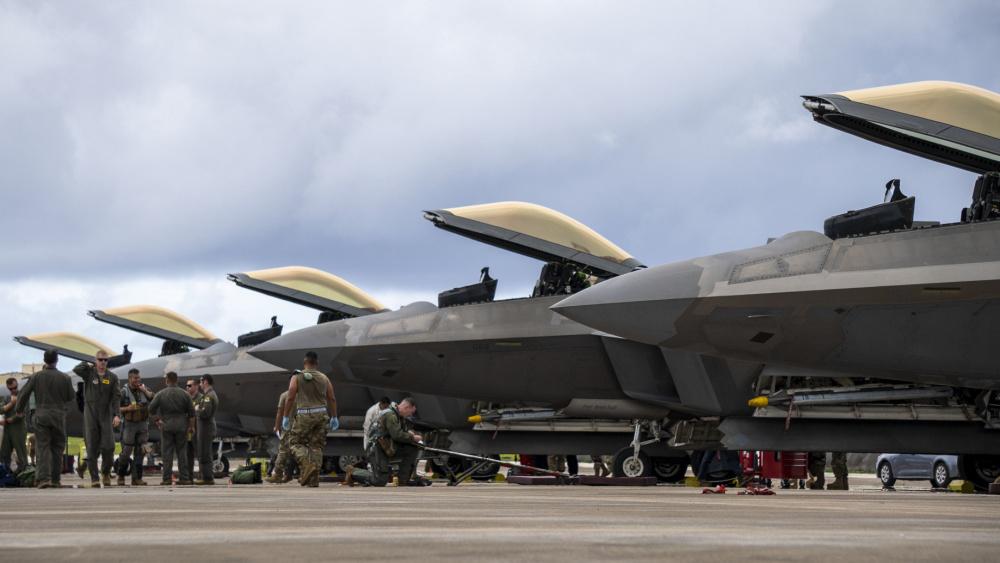Buying military hardware from the US: wish list or shopping list?
Posted By Gregor Ferguson on July 22, 2021 @ 12:45

A few years ago, an American friend of mine cocked an eye at me sceptically when I raised the issue of Australia’s air force buying F-22 Raptors from the United States. ‘It won’t happen,’ he said flatly. ‘The F-22 incorporates a lot of US-only technology. Re-engineering it so that we could export the aircraft would cost a lot of money, and the export customers would have to pay for that.’
The implication was clear: export customers would have to pay a lot more for an inferior product. Besides, an Australian purchase would require the approval of the US Congress and that body has shown no sign whatsoever of wanting to lift the prohibition on exports of the F-22.
My American friend knows what he’s talking about—he was chief designer on another, now-iconic US Air Force stealth aircraft.
The US has never exported a stealthy aircraft, except for the F-35, which I’ll discuss later; stealth technology is an American ‘secret sauce’ and they guard it jealously.
So where does that leave Australians who want to buy a squadron or two of the Americans’ new B-21 Raider stealth bomber? And what about advocates of buying or leasing a flotilla of US Navy nuclear-powered submarines?
If the B-21 is ever exportable, how much of its formidable capability would we actually be allowed to get? And would we be able to maintain the aircraft and its stealthy coatings in-country, and measure its stealth performance periodically? If we can’t do that, then they’re no longer a sovereign, strategic Australian asset: their stealth performance, which is a vital part of their total capability, would be controlled entirely by another government. That’s if we can even get our hands on them.
What about nuclear-powered submarines? Yes, they’d be nice: no range limitations, unlimited submerged endurance, plenty of speed and power. They’d match our operational requirements quite well, I reckon.
But we don’t have a nuclear industry in this country. In fact, there’s a law against having one. So we can’t maintain a nuclear power plant ourselves and can’t even train navy and civilian nuclear engineers. If we had a fleet of nuclear-powered submarines, we’d be relying on another country to do all that for us. Those boats would no longer be a sovereign, strategic Australian asset. Whoever supplied and maintained them, and trained our people, could impose whatever conditions on their use they liked, and we couldn’t do a damn thing about it. Don’t laugh—it’s happened to us before.
Besides, nuclear-powered submarines are another American ‘secret sauce’: what makes anybody think the Yanks will simply build a fleet of Virginia-class submarines for us, just because we ask them nicely? Nuclear-powered submarines are a sovereign, strategic US asset. There’s no way the Americans (or anyone else) would ever share the intimate secrets of their submarine fleet with anybody. And would they agree to export a detuned nuclear boat to a country that lacks the scientific and engineering knowledge and regulatory muscle to operate a nuclear submarine safely? That’s another flat ‘no’.
What about buying a bunch of US Navy Arleigh Burke–class Aegis destroyers instead of the Hunter-class frigates we’re building in Adelaide—that would be cheaper, surely? After all, the Americans are planning to build more than 80 of them.
Maybe not, actually. For one thing, the Arleigh Burkes have a crew of 320, compared with about 160 on the Hunter-class; we have enough trouble manning the ships and submarines we’ve already got and we can’t reduce fleet numbers just because the ships have bigger crews. For another, the US Navy has already announced that it’s about to start replacing these ships with the so-called DDG(X). And we have most of what’s in the Arleigh Burke–class anyway with our own Hobart-class air warfare destroyers (or DDGs, as the navy calls them), which have a crew of 186. If we simply want lots of hulls in the water, we could build more of these; the better we become at doing so, the cheaper they get. But they’re based on a design that’s nearly 30 years old (the Arleigh Burke design is nearly 40 years old) and aren’t the quiet anti-submarine warfare ship the navy wants—hence the Hunter-class.
What about the F-35? It’s a stealthy fighter that’s being exported to 14 countries. But if you look closely, the F-35 assembly line in Fort Worth, Texas, includes a signature measurement facility. This is supposed to measure and validate the stealth signature of each aircraft and ensure it conforms with the customer’s requirements. However, the only people who get to see all of those stealth performance figures are the Americans. Not only do they know how stealthy every F-35 aircraft ever built actually is, but I am willing to bet none of the export models are as stealthy as the ones the US builds for itself.
So, let’s take stock, shall we? The US Congress won’t allow the export of the F-22. It may not allow the export of the B-21, either, and even if we do get some B-21s what are we getting for our money and can we maintain their stealth signature? No government in its right mind will simply build a batch of nuclear submarines for us just because we ask them. And Australian law doesn’t allow us to have a nuclear industry, anyway.
We can’t have a sovereign, strategic operational capability if we depend on another country to maintain our submarines and the stealth coatings on our bombers. Sovereign capability matters—just ask the government.
Where does that leave us? About where we are right now, in my view. So, if we’re going to talk about future capabilities, let’s not indulge in wish lists. Let’s have a sensible conversation about what’s actually doable. Let’s get real.
Article printed from The Strategist: https://aspistrategist.ru
URL to article: /buying-military-hardware-from-the-us-wish-list-or-shopping-list/
Click here to print.